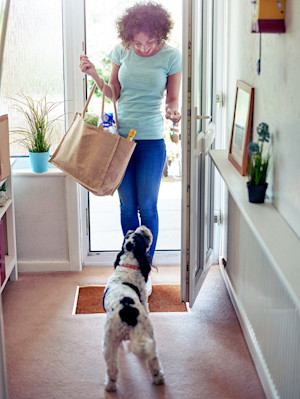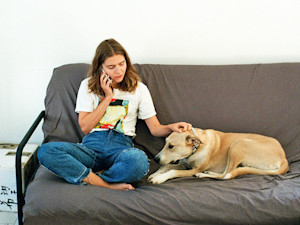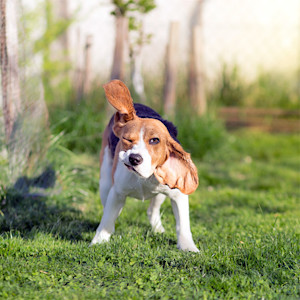5 Ways to Respect Your Dog’s Boundaries (& Not Take Them Personally)
But I thought we were having a moment!
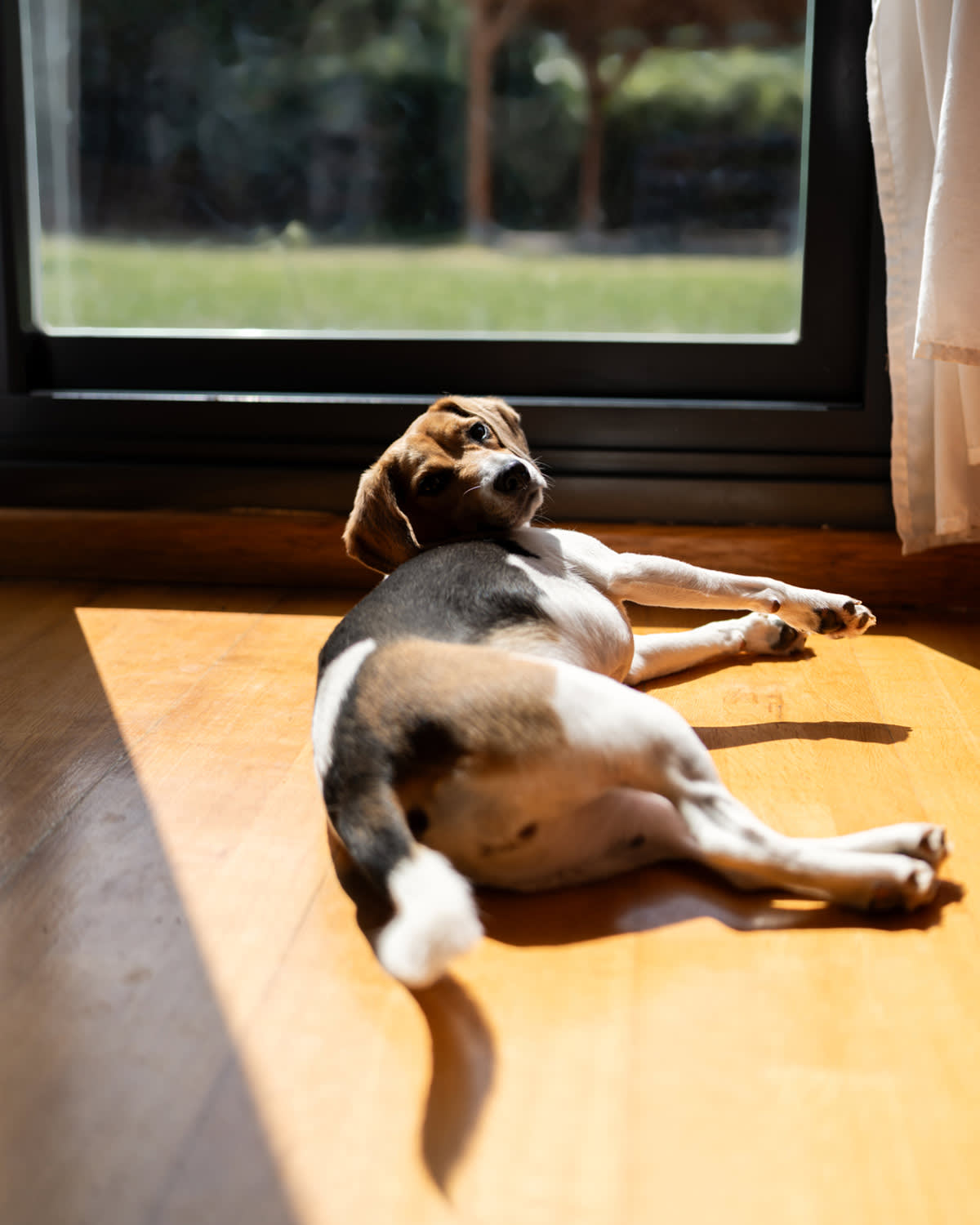
Share Article
In this article:
Why does my dog walk away from me? Should I follow my dog? Do dogs need alone time? Respecting your dog’s boundaries
It’s been a long day. You’ve made a cuppa, thrown on your comfiest hoodie, and curled up on the sofa with your dog. They jump up beside you, your loyal companion, your best pal. You’re certain they’ve been waiting for this wind-down moment just as much as you have. You start stroking their head, and a little sigh of contentment slips out from both of you. Then, mid-stroke… they just get up and walk away.
Um. Excuse me?
Maybe they’re getting a drink, you tell yourself. But after five minutes, there’s still no sign. You find them in the next room, sprawled out on the floor, looking incredibly pleased with themselves.
It feels slightly rude, doesn’t it? But this moment (so common for dog parents) raises a good question: why do dogs sometimes just… leave? Are they annoyed? Did you do something wrong? Are they OK?
We asked the dog trainer and separation anxiety specialist, Jo Sellersopens in new tab, to explain why dogs wander off, whether we should follow, and how to know when our dogs need a little time.
Why do dogs leave the room?
There are several reasons why your dog might suddenly exit stage left mid-cuddle. The good news is that most of them are completely normal and not a sign of rejection at all:
They’re overstimulated
Just like us, dogs can get overwhelmed. If your petting session has gone on for a while or they’re in a noisy environment, they might seek out a quieter space to reset.
“Not all dogs like physical contact, and some dogs take time to build that bond with us enough to trust us,” says Jo. “My dog loves to press her body right up against me, but if I go to stroke her, she moves away. She wants the contact, but not the motion of stroking on her.”
They’re seeking comfort
Dogs are sensitive to temperature and sound. Maybe that other room is cooler, quieter or... just has a fluffier rug.
Jo has had to accept that her dog is a “warm” dog, “She will often move away if she gets too hot next to me,” she explains.
It’s part of their routine
Some dogs follow a pattern. Maybe they always nap on that specific mat after 8pm. You just got caught in their schedule.
They sense a shift in your mood
Dogs are incredibly attuned to our energy. If you’re feeling stressed, anxious or distracted, your dog may pick up on that and decide now isn’t the time for cuddles.
They’re looking for something
It could be a toy, a treat crumb under the table, or a more exciting sound elsewhere in the house.
Should you follow them?
It depends.
There are moments when it’s absolutely fine (and even wise) to check on them:
If your dog is a puppy, senior or has health issues, it’s smart to keep an eye on them.
If they seem unsettled or are pacing a lot, they might need help or reassurance.
But sometimes, as hard as it may be, it’s best to leave them be.
Many dogs, even the most loyal ones, value their alone time. Here’s how to know if your dog’s saying ‘I need a break’:
They sigh or huff when you approach.
They turn their head away or avoid eye contact.
Their tail is low or tucked.
They lick their lips or yawn (both subtle signs of stress).
These little signals mean: I need a moment.
Jo reminds us, “We put such high expectations on our dogs, insisting they accept all cuddles, lifts and handling on our terms. And we give little credit to what they need and their individual personality. Just like us, they are all different.”
Do dogs need alone time?
As an introvert, I require alone time to recharge. And just like humans, dogs have different social needs. Some are velcro dogs (glued to your side) while others are more independent. However, dogs can’t label their personality or explain the motivation behind their actions, so introversion and extroversion in dogs can be a little more complex.
“Some dogs are introverted too,” says Jo. “They prefer their own space, and most dogs need time away from us and the chaos of the household to fully relax and to process any thoughts they are having – maybe they’ve just been training or using their brains on walks to cope with what’s around them.”
By respecting these traits, we actually build more trust with our pets. A dog who knows their space will be honoured and is more likely to come to you when they do want attention. It also reduces anxiety and helps them feel safe in their environment.
Jo has seen this play out in practice: “I’ve worked with some dogs where, despite the pet parent’s efforts, they were not a cuddly dog. The dog wasn’t fully trusting that they wouldn’t be ‘manhandled’ from their point of view. Some were just slow-burner dogs who needed more time before they felt comfortable enough to relax in the same room.”
Tips for respecting your dog’s boundaries
Want to be the best roommate your dog’s ever had? Here’s how:
Let them initiate affection
If they want pats, they’ll nudge your hand or sit close. If they walk away, let them.
Create safe zones
Give them a comfy bed in a quiet part of the house that’s just for them. Somewhere they know they won’t be disturbed.
Avoid forced interaction
Don’t call them over or try to engage if they’ve retreated. It’s not personal – it’s self-care.
Keep routines consistent
Dogs feel safest when they know what to expect. Try to feed, walk and wind down at roughly the same times each day.
Know when to seek help
If your dog suddenly becomes distant, hides often, or seems withdrawn, it’s worth checking in with your vet or a behaviourist.
So, next time your dog gets up and leaves mid-cuddle, try not to take it personally. They’re not giving you the cold shoulder, they’re just honouring their own needs. Let your dog have their downtime. When they’re ready for snuggles again, they’ll come find you. And chances are, the reunion will feel even sweeter.
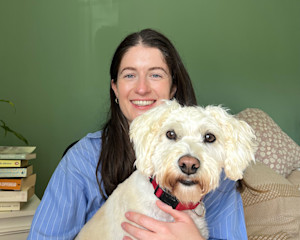
Nuala McHugh
Nuala is a writeropens in new tab with a background in PR. She has worked with brands including Jollyes, Universal Studios, and Amazon. Based in Northern Ireland, she is now doing what she loves most: writing with her clingy cockapoo Bobby by her side.
Related articles
Is Daycare Overwhelming Your Dog? How to Spot the Signs
There’s such thing as too much play
![dog greeting a woman at the door]()
Why Is My Dog Obsessed With Sniffing Me Every Time I Come Home?
From your mood to where you’ve been, your dog’s sniffing tells them a lot about you
Why Is My Dog Obsessed With Snapping the Air?
If your dog is snapping at the air, it could be more than just play
![]()
Does Your Dog Understand When You’re On the Phone?
And do they want to join in?
![Beagle dog shaking body and ears]()
Why is My Dog Obsessed With ‘Shaking It Off’, Even When They’re Dry?
It’s more than just a quirky habit


